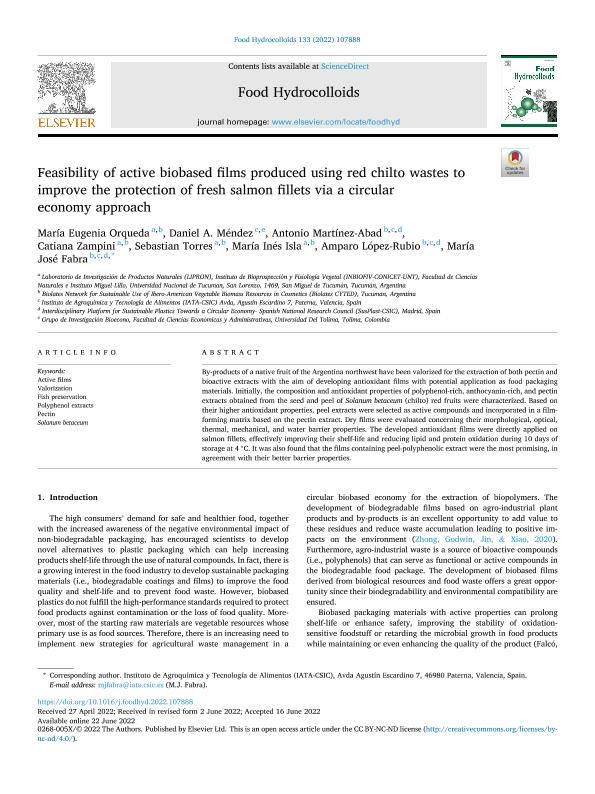Mostrar el registro sencillo del ítem
dc.contributor.author
Orqueda, Maria Eugenia

dc.contributor.author
Méndez, Daniel A.
dc.contributor.author
Martínez Abad, Antonio
dc.contributor.author
Zampini, Iris Catiana

dc.contributor.author
Torres, Sebastián

dc.contributor.author
Isla, Maria Ines

dc.contributor.author
Lopez Rubio, Amparo

dc.contributor.author
Fabra, María José
dc.date.available
2023-11-28T12:50:38Z
dc.date.issued
2022-12
dc.identifier.citation
Orqueda, Maria Eugenia; Méndez, Daniel A.; Martínez Abad, Antonio; Zampini, Iris Catiana; Torres, Sebastián; et al.; Feasibility of active biobased films produced using red chilto wastes to improve the protection of fresh salmon fillets via a circular economy approach; Elsevier; Food Hydrocolloids; 133; 107888; 12-2022; 1-9
dc.identifier.issn
0268-005X
dc.identifier.uri
http://hdl.handle.net/11336/218652
dc.description.abstract
By-products of a native fruit of the Argentina northwest have been valorized for the extraction of both pectin and bioactive extracts with the aim of developing antioxidant films with potential application as food packaging materials. Initially, the composition and antioxidant properties of polyphenol-rich, anthocyanin-rich, and pectin extracts obtained from the seed and peel of Solanum betaceum (chilto) red fruits were characterized. Based on their higher antioxidant properties, peel extracts were selected as active compounds and incorporated in a film-forming matrix based on the pectin extract. Dry films were evaluated concerning their morphological, optical, thermal, mechanical, and water barrier properties. The developed antioxidant films were directly applied on salmon fillets, effectively improving their shelf-life and reducing lipid and protein oxidation during 10 days of storage at 4 °C. It was also found that the films containing peel-polyphenolic extract were the most promising, in agreement with their better barrier properties.
dc.format
application/pdf
dc.language.iso
eng
dc.publisher
Elsevier

dc.rights
info:eu-repo/semantics/openAccess
dc.rights.uri
https://creativecommons.org/licenses/by-nc-nd/2.5/ar/
dc.subject
ACTIVE FILMS
dc.subject
FISH PRESERVATION
dc.subject
PECTIN
dc.subject
POLYPHENOL EXTRACTS
dc.subject
SOLANUM BETACEUM
dc.subject
VALORIZATION
dc.subject.classification
Bioquímica y Biología Molecular

dc.subject.classification
Ciencias Biológicas

dc.subject.classification
CIENCIAS NATURALES Y EXACTAS

dc.title
Feasibility of active biobased films produced using red chilto wastes to improve the protection of fresh salmon fillets via a circular economy approach
dc.type
info:eu-repo/semantics/article
dc.type
info:ar-repo/semantics/artículo
dc.type
info:eu-repo/semantics/publishedVersion
dc.date.updated
2023-11-15T15:47:03Z
dc.journal.volume
133
dc.journal.number
107888
dc.journal.pagination
1-9
dc.journal.pais
Países Bajos

dc.journal.ciudad
Amsterdam
dc.description.fil
Fil: Orqueda, Maria Eugenia. Universidad Nacional de Tucumán. Instituto de Bioprospección y Fisiología Vegetal. Consejo Nacional de Investigaciones Científicas y Técnicas. Centro Científico Tecnológico Conicet Noa Sur. Instituto de Bioprospección y Fisiología Vegetal; Argentina. Biolates Network for Sustainable Use of Ibero-American Vegetable Biomass Resources in Cosmetics; Argentina
dc.description.fil
Fil: Méndez, Daniel A.. Consejo Superior de Investigaciones Científicas. Instituto de Agroquímica y Tecnología de Alimentos; España. Universidad del Tolima; Colombia
dc.description.fil
Fil: Martínez Abad, Antonio. Consejo Superior de Investigaciones Científicas. Instituto de Agroquímica y Tecnología de Alimentos; España. Consejo Superior de Investigaciones Científicas; España. Biolates Network for Sustainable Use of Ibero-American Vegetable Biomass Resources in Cosmetics; Argentina
dc.description.fil
Fil: Zampini, Iris Catiana. Universidad Nacional de Tucumán. Instituto de Bioprospección y Fisiología Vegetal. Consejo Nacional de Investigaciones Científicas y Técnicas. Centro Científico Tecnológico Conicet Noa Sur. Instituto de Bioprospección y Fisiología Vegetal; Argentina. Biolates Network for Sustainable Use of Ibero-American Vegetable Biomass Resources in Cosmetics; Argentina
dc.description.fil
Fil: Torres, Sebastián. Universidad Nacional de Tucumán. Instituto de Bioprospección y Fisiología Vegetal. Consejo Nacional de Investigaciones Científicas y Técnicas. Centro Científico Tecnológico Conicet Noa Sur. Instituto de Bioprospección y Fisiología Vegetal; Argentina. Biolates Network for Sustainable Use of Ibero-American Vegetable Biomass Resources in Cosmetics; Argentina
dc.description.fil
Fil: Isla, Maria Ines. Universidad Nacional de Tucumán. Instituto de Bioprospección y Fisiología Vegetal. Consejo Nacional de Investigaciones Científicas y Técnicas. Centro Científico Tecnológico Conicet Noa Sur. Instituto de Bioprospección y Fisiología Vegetal; Argentina. Biolates Network for Sustainable Use of Ibero-American Vegetable Biomass Resources in Cosmetics; Argentina
dc.description.fil
Fil: Lopez Rubio, Amparo. Consejo Superior de Investigaciones Científicas. Instituto de Agroquímica y Tecnología de Alimentos; España. Consejo Superior de Investigaciones Científicas; España. Biolates Network for Sustainable Use of Ibero-American Vegetable Biomass Resources in Cosmetics; Argentina
dc.description.fil
Fil: Fabra, María José. Consejo Superior de Investigaciones Científicas. Instituto de Agroquímica y Tecnología de Alimentos; España. Consejo Superior de Investigaciones Científicas; España. Biolates Network for Sustainable Use of Ibero-American Vegetable Biomass Resources in Cosmetics; Argentina
dc.journal.title
Food Hydrocolloids

dc.relation.alternativeid
info:eu-repo/semantics/altIdentifier/doi/http://dx.doi.org/10.1016/j.foodhyd.2022.107888
dc.relation.alternativeid
info:eu-repo/semantics/altIdentifier/url/https://www.sciencedirect.com/science/article/pii/S0268005X22004088
Archivos asociados
